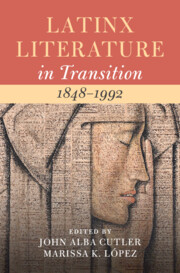Book contents
- Latinx Literature in Transition, 1848–1992
- Latinx literature in transition
- Latinx Literature in Transition, 1848–1992
- Copyright page
- Dedication
- Contents
- Figures
- Contributors
- Acknowledgments
- Introduction
- Part I Space
- Part II Being
- Part III Time
- Part IV Form
- Part V Labor
- Chapter 17 Seeking Parteras in the Archive
- Chapter 18 The Work of War
- Chapter 19 Farmworker Culture in Literature and Film, or Tomás Rivera’s Brown Noir
- Chapter 20 The Specter of Neoliberalism
- Bibliography
- Index
- References
Chapter 18 - The Work of War
Latinx Literature, Racial Schismatics, and Possible Solidarities
from Part V - Labor
Published online by Cambridge University Press: 10 April 2025
- Latinx Literature in Transition, 1848–1992
- Latinx literature in transition
- Latinx Literature in Transition, 1848–1992
- Copyright page
- Dedication
- Contents
- Figures
- Contributors
- Acknowledgments
- Introduction
- Part I Space
- Part II Being
- Part III Time
- Part IV Form
- Part V Labor
- Chapter 17 Seeking Parteras in the Archive
- Chapter 18 The Work of War
- Chapter 19 Farmworker Culture in Literature and Film, or Tomás Rivera’s Brown Noir
- Chapter 20 The Specter of Neoliberalism
- Bibliography
- Index
- References
Summary
Debates about Latinx literary representations of war tend to emphasize either how Latinx literature offers a means of repair for war’s ravages or, alternatively, that violence is constitutive of latinidad itself. This chapter charts a middle course through both positions by arguing that US Latinx literature highlights both irresolute, unreconciled wars and, what Jesse Alemán describes as Latinx “micro-wars” within major conflicts; such micro-wars, furthermore, often involve clashes and negotiations around the racialized boundaries of Latinx communities. Here we survey a range of Latinx representations of the Civil War, World War II, the Korean War, and wars of revolution and counterinsurgency in Viet Nam and Central America. Rather than waging war on an irredeemable enemy, we conclude, Latinxs lay siege to the imperial relationship championed by the US in most of these conflicts.
Keywords
- Type
- Chapter
- Information
- Latinx Literature in Transition, 1848–1992 , pp. 315 - 332Publisher: Cambridge University PressPrint publication year: 2025

